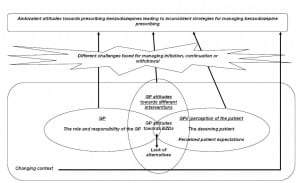
A new study has been published in BMC Family Practice on’General practitioners’ experiences and perceptions of benzodiazepine prescribing: systematic review and meta-synthesis‘. The study was conducted by teams of researchers from the Universities of Lincoln (Coral Sirdifield, Susan Chipchase, Niro Siriwardena), Antwerp (Sibyl Anthierens) and Ghent (Hanne Creupelandt, Thierry Christiaens) who have been working on benzodiazepine and sleeping tablet prescribing by family doctors over the past decade.
 The investigators systematically reviewed and synthesised the qualitative literature on benzodiazepine prescribing by family doctors. The analysis of eight studies from seven countries published between 1993 and 2010 showed that prescribing decisions for benzodiazepines were complex, uncomfortable, and demanding. There was variation between GPs and in individual GPs in the extent to which they were willing to prescribe benzodiazepines. GPs were ambivalent and inconsistent in attitudes towards benzodiazepines prescribing because of the changing context of prescribing, differing perceptions of the role and responsibility of the GP, variation in GPs’ attitudes to benzodiazepines, perceived lack of alternative treatment options and GPs’ perception of patient expectations and the doctor-patient relationship.
The investigators systematically reviewed and synthesised the qualitative literature on benzodiazepine prescribing by family doctors. The analysis of eight studies from seven countries published between 1993 and 2010 showed that prescribing decisions for benzodiazepines were complex, uncomfortable, and demanding. There was variation between GPs and in individual GPs in the extent to which they were willing to prescribe benzodiazepines. GPs were ambivalent and inconsistent in attitudes towards benzodiazepines prescribing because of the changing context of prescribing, differing perceptions of the role and responsibility of the GP, variation in GPs’ attitudes to benzodiazepines, perceived lack of alternative treatment options and GPs’ perception of patient expectations and the doctor-patient relationship.

The model developed by the research team could be used to inform future interventions to improve adherence to benzodiazepine prescribing guidance and improve prescribing. This could be brought about through various means including education and training of professionals on benzodiazepine use and withdrawal, greater provision of alternatives to drugs, reflective practice, and better communication with patients.
